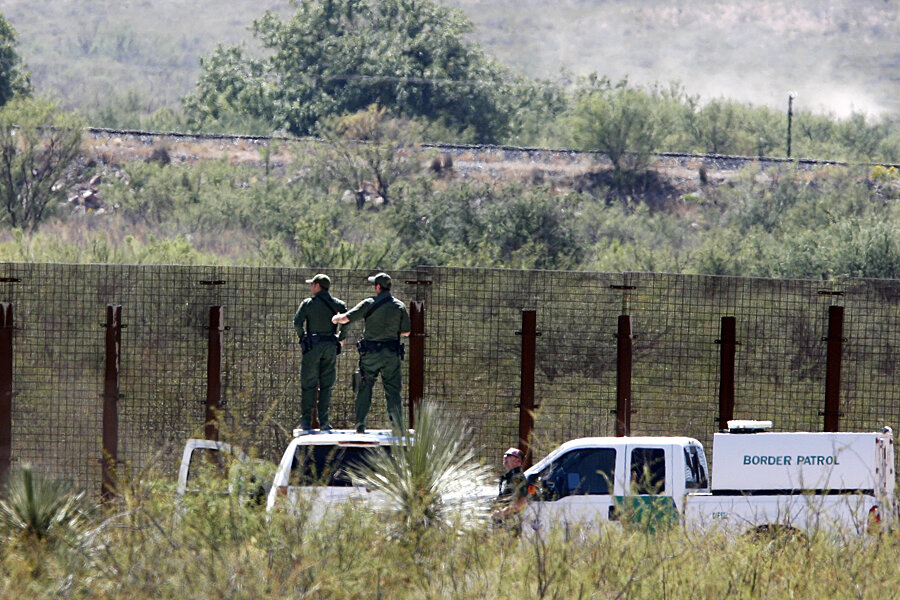Will Mexico's capture of 'El Chapo' mean border instability? US agents on alert.
Loading...
| Tucson, Ariz.
The weekend capture of top drug lord Joaquín "El Chapo" Guzmán is being hailed as a major victory for Mexico, but some are cautioning that his arrest could unleash a wave of violence, particularly along the US-Mexico border.
Mr. Guzmán had control of, among other areas, the state of Sonora, which shares the international boundary with Arizona. Sonora is no stranger to violence triggered by disturbance to drug cartel leadership: In December 2009, when Mexican security forces killed Arturo Beltrán Leyva, a former Guzmán ally-turned-rival, the death ushered in a battle between factions in the city of Nogales, which shares its name with its US neighbor, and surrounding communities.
In one instance, a shootout left at least 21 people dead.
Now, after Guzmán’s capture, "you will see areas that are contested," says Anthony Coulson, who headed the Tucson, Ariz., office of the Drug Enforcement Administration (DEA) until he retired in 2010. "We'll see a significant amount of violence that will occur in the drug-smuggling corridors."
Mr. Coulson foresees bloodshed over the next year not just in Sonora, but all along the 2,000-mile US-Mexico border, as Guzmán's associates reorganize and fend off rival drug traffickers.
Guzmán, Mexico's most famous modern fugitive, was taken into custody Saturday morning in the beach town of Mazatlán in his home state of Sinaloa. He had been on the lam since escaping from prison in 2001.
US authorities are keeping a close watch for any potential violence in the border region, says Tony Estrada, Santa Cruz County sheriff in Nogales, Ariz. The town is headquarters for a slew of local, state, and federal agents.
"We have a strong contingency of law enforcement here," Sheriff Estrada says. "We're always on the alert, and we're always mindful of the fact that things are happening in Mexico with regard to drugs and the cartels, and especially as a result of this arrest."
The border crossing at Nogales, in fact, was where Serafin Zambada-Ortiz, the son of Guzmán’s No. 2 man, was arrested in November on drug charges.
Mexican authorities worked with US law enforcement to catch Guzmán, who had achieved most-wanted status on both sides of the border and beyond.
A DEA spokeswoman in Phoenix says the agency continues to monitor developments related to Guzmán's "colossal arrest."
"This was a big blow to the Sinaloa cartel leadership," Ramona Sánchez says. "We know it's going to weaken the cartel in the months to come. How that's going to be reflected, we're not sure."
One way violence could erupt is if a drug cartel such as Los Zetas attempts to wrest power from Guzmán's cartel, says Julie Murphy Erfani, a political science professor at Arizona State University in Tempe who studies Mexico's drug war.
"The Zetas are very volatile and unpredictable, and they have fewer scruples than practically any other organization," the professor adds, although she doubts they could succeed in toppling Guzmán's powerful, albeit disrupted, organization.
The extent of damage to the Sinaloa cartel, says Coulson, the retired DEA agent, will largely depend on the strength of its next boss and whether authorities clamp down on the organization that Guzmán leaves behind.
"You could take out Chapo but if you leave his people, they'll be able to sustain themselves for a period of time," he says.
David Shirk, a political science professor and director of the Justice in Mexico Project at the University of San Diego, takes a different view on a possible surge in violence as a result of the kingpin's arrest, noting that none was apparent after Mexican Marines nabbed Miguel Angel Treviño Morales in July. The notoriously brutal leader of the Zetas was captured in Nuevo Laredo, Tamaulipas, near the Texas border.
Although violence levels remain high in some areas of Mexico, Professor Shirk says, "big surges in violence haven't happened as a result of the tension of particular cartel leaders in the last year."
He also notes that Guzmán's organization may be structured in such a way that it can continue to function without him at the helm.
Still, Coulson expects a slowdown in drug smuggling, particularly heroin and methamphetamine, since "those are controlled almost exclusively by Chapo Guzmán."







